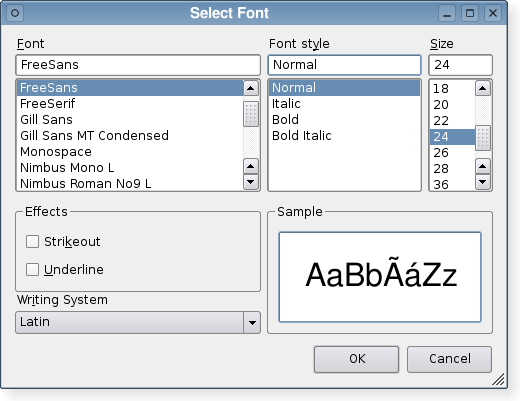| Home · All Classes · Main Classes · Grouped Classes · Modules · Functions |
The QFontDialog class provides a dialog widget for selecting a font. More...
#include <QFontDialog>
Inherits QDialog.
The QFontDialog class provides a dialog widget for selecting a font.
A font dialog is created through one of the static getFont() functions.
Examples:
bool ok;
QFont font = QFontDialog::getFont(
&ok, QFont("Helvetica [Cronyx]", 10), this);
if (ok) {
// the user clicked OK and font is set to the font the user selected
} else {
// the user canceled the dialog; font is set to the initial
// value, in this case Helvetica [Cronyx], 10
}
The dialog can also be used to set a widget's font directly:
myWidget.setFont(QFontDialog::getFont(0, myWidget.font()));
If the user clicks OK the font they chose will be used for myWidget, and if they click Cancel the original font is used.

See also QFont, QFontInfo, QFontMetrics, QColorDialog, QFileDialog, QPrintDialog, and Standard Dialogs Example.
Executes a modal font dialog and returns a font.
If the user clicks OK, the selected font is returned. If the user clicks Cancel, the initial font is returned.
The dialog is constructed with the given parent. caption is shown as the window title of the dialog and initial is the initially selected font. If the ok parameter is not-null, the value it refers to is set to true if the user clicks OK, and set to false if the user clicks Cancel.
Examples:
bool ok;
QFont font = QFontDialog::getFont(&ok, QFont("Times", 12), this);
if (ok) {
// font is set to the font the user selected
} else {
// the user canceled the dialog; font is set to the initial
// value, in this case Times, 12.
}
The dialog can also be used to set a widget's font directly:
myWidget.setFont(QFontDialog::getFont(0, myWidget.font()));
In this example, if the user clicks OK the font they chose will be used, and if they click Cancel the original font is used.
This is an overloaded member function, provided for convenience.
Call getFont(ok, def, parent) instead.
The name parameter is ignored.
This is an overloaded member function, provided for convenience.
Call getFont(ok, parent) instead.
The name parameter is ignored.
This is an overloaded member function, provided for convenience.
This is an overloaded member function, provided for convenience.
Executes a modal font dialog and returns a font.
If the user clicks OK, the selected font is returned. If the user clicks Cancel, the Qt default font is returned.
The dialog is constructed with the given parent. If the ok parameter is not-null, the value it refers to is set to true if the user clicks OK, and false if the user clicks Cancel.
Example:
bool ok;
QFont font = QFontDialog::getFont(&ok, this);
if (ok) {
// font is set to the font the user selected
} else {
// the user canceled the dialog; font is set to the default
// application font, QApplication::font()
}
| Copyright © 2008 Trolltech | Trademarks | Qt 4.3.5 |